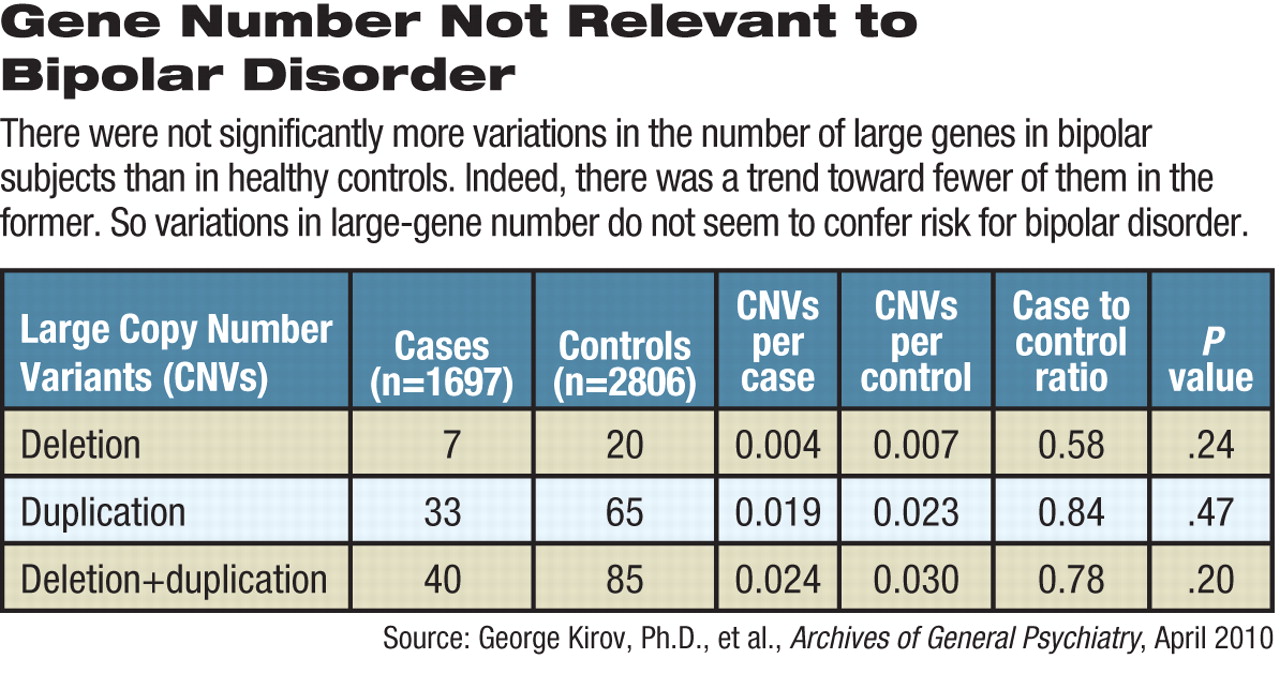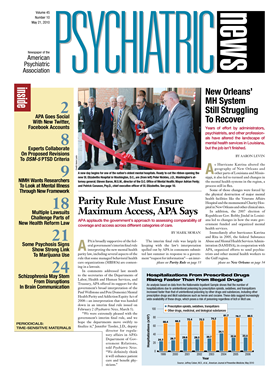Variations in gene number have been linked to schizophrenia, but not to bipolar disorder, George Kirov, Ph.D., a senior lecturer in psychological medicine at Cardiff University in Wales, and colleagues reported in the April Archives of General Psychiatry.
This finding came as a surprise, “as the two disorders have a shared genetic component,” Kirov told Psychiatric News.
The researchers compared variations in the number of genes in 440 subjects who had been diagnosed with schizophrenia with those in 2,806 control subjects who did not have a psychiatric illness. They found significantly more in the former as far as large genes were concerned. These variations included mostly gene deletions, but also one gene duplication. One of the gene deletions, on chromosome 22, has also been implicated in velocardiofacial syndrome, a hereditary condition that can cause cleft palate and defects of the parathyroid and thymus glands and of the conotruncal region of the heart.
These gene deletions and duplications probably confer risk for schizophrenia, the scientists reasoned.
The researchers then compared variations in the number of large genes in 1,697 subjects with bipolar disorder with those in the same 2,806 control subjects.
There were not significantly more variations in the bipolar subjects than in the controls, they found. Indeed, there was a trend toward fewer gene-copy-number variations in the bipolar subjects than in the controls. Moreover, they observed no instances in the subjects with bipolar illness of the chromosome 22 gene deletion implicated in schizophrenia and the velocardiofacial syndrome. In contrast, they had observed two such instances in their much smaller schizophrenia sample.
Thus the large-gene deletions and duplications that seem to confer risk for schizophrenia do not seem to do so for bipolar disorder, the researchers concluded.
Yet another comparison of large-gene-number variations—this time between the 440 subjects with schizophrenia and the 1,697 subjects with bipolar illness—confirmed this conclusion.
They observed a significant excess of variations in those with schizophrenia compared with those who had bipolar disorder both for total number of variations and for gene deletions specifically. There were five times more deletions and twice as many duplications in the schizophrenia group as in the bipolar one.
So if variations in gene number contribute to schizophrenia, but not to bipolar disorder, one can assume that gene mutations play a larger role in bipolar susceptibility than gene-number variations do, said Kirov.
And if variations in gene number contribute to schizophrenia, but not to bipolar disorder, can one assume that gene-number variations play a greater role in schizophrenia susceptibility than gene mutations do? No, Kirov replied, and here's why: “So far the only firm findings [in schizophrenia] support the role of variations in gene number. However, the ones that we know are pathogenic are very rare, probably found combined in just around 3 percent of patients. I don't think that number will increase tremendously.... This leaves a larger role for mutations in genes. Sequencing studies are only now coming up, so in the next two to three years, I expect a lot of mutations to be found. I personally expect that point mutations will explain a larger part of the genetics of schizophrenia than copy-number variations will.”
The study was funded by the Wellcome Trust and the United Kingdom Medical Research Council.

